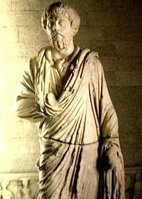 Plato said that, in an ideal society, the philosophers would be the kings, or the kings would be philosophers. Marcus Aurelius in some ways would seem to be exactly the kind of "philosopher emperor" Plato would have wanted. Please read the opening sections of Marcus Aurelius' Meditations. Choose a line that particularly well shows one of the things Aurelius particularly values, and note whether this value would make him a good emperor or not.
Plato said that, in an ideal society, the philosophers would be the kings, or the kings would be philosophers. Marcus Aurelius in some ways would seem to be exactly the kind of "philosopher emperor" Plato would have wanted. Please read the opening sections of Marcus Aurelius' Meditations. Choose a line that particularly well shows one of the things Aurelius particularly values, and note whether this value would make him a good emperor or not.
"From Maximus I learned self-government, and not to be led aside by anything;"
ReplyDeleteI chose this line because it shows that he is conscious of what he allows himself to do and think. Being able to control what he did and put his time into would help him as emperor and help him to not make any rash decisions.
I decided to choose line 5, “From my governor, to be neither of the green nor of the blue party at the games in the Circus, nor a partisan either of the Parmularius or the Scutarius at the gladiators’ fights; from him to I learned endurance of labour, and to want little, and to work with my own hands, and not to meddle with other people’s affairs, and not to be ready to listen to slander.”
ReplyDeleteI think the general thing I found out from Marcus Aurelius, was his ability to not choose sides, and remain neutral. Through the gladiator games, as well as other events that happened inside Rome, people tended to take sides, and as an emperor, that’s the worst thing you can do. At the emperor position, or even really any position of power, it’s important to be able to remain neutral and to do things that are best for the entire Empire of Rome, not just your friends or your political alliance. I think Marcus demonstrated that throughout his tenure as emperor of Rome, and especially during that time period, having these types of emperors step up to the plate and have success guiding the Roman people. I also think too, one of the things that stuck out to me was his willingness not to meddle in people’s affairs, and to remain as loyal and neutral as possible. Not just in the Roman Empire, but when leaders mettle in other people’s relationships or issues, it tends to bring upon more issues for the nation, than actually issues being resolved. I think that’s important too because there were always seemingly affair issues that revolved around Rome, and sometimes in the political landscape, and having that safety net was one of the reasons why he was a good emperor for Rome.
- Nile Hesson
"From my mother, piety and beneficence, and abstinence, not only from evil deeds, but even from evil thoughts; and further simplicity in my way of living, far removed from the habits of the rich."
ReplyDeleteThis is a great thing to inherit from someone, especially for an emperor. A mother's example to her child can create great leaders or catastrophic destroyers, and in the history of the Roman people, mothers have created both. Abstinence from evil deeds and thoughts will yield beneficial results when it comes to being emperor, as these evil deeds can lead to the destruction of oneself and of the entire nation, as we have seen from previous rulers.
-Lauren Bland